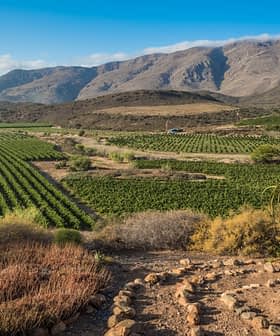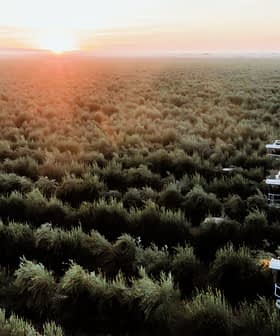Efforts to diversify the Omani economy are bearing fruit, according to officials in the small kingdom on the southeastern coast of the Arabian Peninsula.
Previously known for its pomegranates, apricots and figs, the mountainous Al Jabal Al Akhdar region quickly became the heart of Omani olive oil production.
Ten years after the first olive trees were planted in the region, producers in Al Jabal Al Akhdar yielded 10,000 liters of olive oil from 20,000 trees planted on 40 hectares in the 2022/23 crop year.
See Also:The Growing Pains of Albania’s Ascendant Olive Oil Sector“This yield, valued at around 200,000 Omani Rial (€484,000), marked a significant milestone for the region’s olive cultivation,” Abdul Aziz bin Mansour al Shanfari, an official in the country’s Ministry of Agriculture, Fisheries and Water Resources, told local media.
Oman is an oil-rich Gulf state home to 4.5 million people. However, significant efforts are underway to diversify its economy, with officials identifying olive growing as one way to do so.
Ali Saleh Abdullah Al Forqani, the deputy director general of the Royal Gardens and Farm Affairs for Oman, said the kingdom’s push to promote olive oil production is part of wider plans to promote agricultural development and diversify crop cultivation.
“The climate and terrain of Al Jabal Al Akhdar are conducive to olive cultivation, especially in areas with favorable soil conditions and sufficient water resources,” he told Olive Oil Times. “Leveraging these natural advantages facilitates the effective use of resources.”
The Omani government is currently distributing thousands of free olive tree seedlings to farmers, encouraging the cultivation of olive varieties suited to Oman’s climate, and providing technical advice to millers.
Currently, the government is distributing 20 varieties of table olives and olive oil olives from Spain, Egypt, Tunisia and Syria to determine which ones work best in the country’s climate.
According to Al Forqani, the government is also working with the private sector to share scientific research and practical demonstrations on olive tree cultivation, olive grove maintenance and quality assessment.
Al Jabal Al Akhdar is a mountainous region in the north of the country, which Al Forqani said it is “characterized by arid to semi-arid climates, with high temperatures and minimal rainfall during the summer months.”
While dates, tomatoes, cucumbers, green chilies, peppers, watermelons, sorghum and melons are the most popular crops in Oman, the impacts of climate change are pushing farmers toward olives.
“Climate change poses a significant challenge to Oman’s agricultural practices, with current effects and future predictions highlighted in recent reports,” Al Forqani said. “These impacts underscore the importance of understanding and mitigating the consequences of climate change on agricultural sustainability and water resource management.”
Despite 10 years of olive cultivation, olive oil remains a new product for Oman. Most olive oil consumed in the country is imported from Spain and its Middle Eastern allies, but Al Forqani sees potential, especially as awareness of its health benefits and culinary applications grows.
“As this product and market are still relatively new in Oman, it will require some time to develop,” he said. “However, there is a growing interest among consumers regarding the nutritional benefits of authentic local products, such as olive oil.”
Al Forqani said the Royal Gardens submitted Omani extra virgin olive oils to several quality competitions in Europe, earning a total of 13 awards.
“Such achievements raise awareness about the health benefits and quality of this product, leading to an increase in the number of farmers engaging in olive cultivation in recent years, as well as a rise in the number of olive mills and sales over the past five years,” he said.









